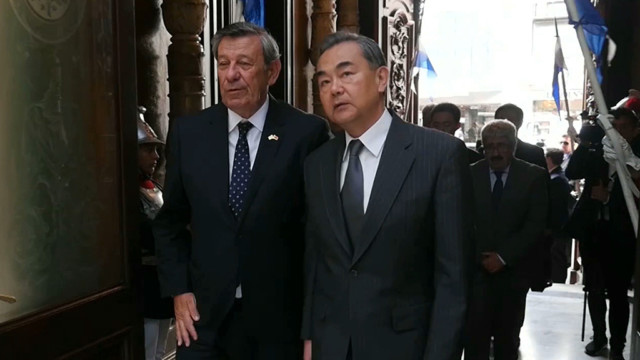A possible free trade agreement with Uruguay is at the top of the “to-do” for Chinese Foreign Minister Wang Yi on his visit to Uruguay. So far, only minor agreements have been signed. CGTN’s Joel Richards reports.
It’s been 30 years since China and Uruguay established diplomatic ties. Few capital cities are further apart geographically from Beijing, but Montevideo hopes to have an even greater role in China’s future.
Chinese Foreign Minister Wang Yi first met with Uruguayan President Tabarez Vazquez before sitting down with his Uruguayan counterpart, Rodolfo Nin Novoa. The ministers signed an agreement to ease business visas, but the overriding question here was when the two countries will shake on a proposed Free Trade Agreement.
“Signing the Free Trade Agreement with China will bring greater opportunity for Uruguay’s development,” China’s Foreign Minister, Wang Yi said. “Once signed, China will have access to a market of 3.5 million consumers, but Uruguay will have access to a market of 1.3 billion. It is a straight forward calculation, everyone knows the answer.”
Three decades ago, Uruguay began exporting wool to China. Now, according to government agencies, more than 20 percent of exports go to China with soy and beef being the main products. The head of the Exporters Union said Uruguay’s government and private sector want the agreement signed.
“Our competitors in beef exports like Australia and New Zealand have (free trade) agreements with China, they pay fewer taxes, they also have the advantage which is that they are closer,” explained Teresa Aishemberg, director of the Uruguay Exporters Union.
On Wednesday, Uruguay’s foreign minister talked about the stumbling block – the need to convince fellow Mercosur trade members Argentina and Brazil, who would prefer to negotiate any deal as a bloc. While negotiations continue, there were also talks in Montevideo over Uruguay’s ambition to become a South Atlantic transportation hub in the region, forming an integral part of China’s Belt and Road Initiative.
 CGTN America
CGTN America

